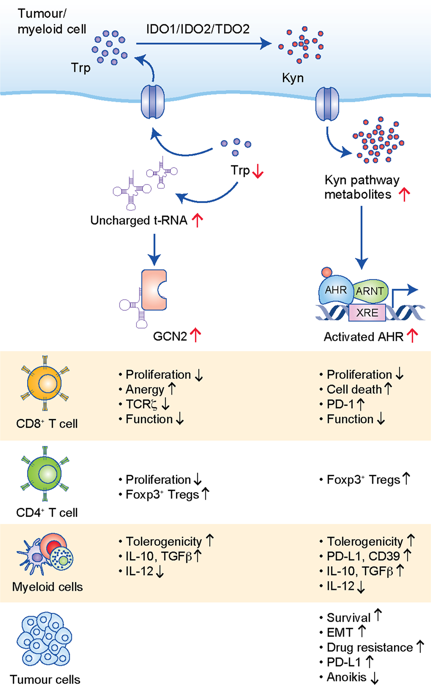当前位置:
X-MOL 学术
›
Br. J. Cancer
›
论文详情
Our official English website, www.x-mol.net, welcomes your feedback! (Note: you will need to create a separate account there.)
The therapeutic potential of targeting tryptophan catabolism in cancer.
British Journal of Cancer ( IF 8.8 ) Pub Date : 2019-12-10 , DOI: 10.1038/s41416-019-0664-6 Christiane A Opitz 1, 2 , Luis F Somarribas Patterson 1, 3 , Soumya R Mohapatra 1 , Dyah L Dewi 1, 4 , Ahmed Sadik 1, 3 , Michael Platten 5, 6 , Saskia Trump 7
British Journal of Cancer ( IF 8.8 ) Pub Date : 2019-12-10 , DOI: 10.1038/s41416-019-0664-6 Christiane A Opitz 1, 2 , Luis F Somarribas Patterson 1, 3 , Soumya R Mohapatra 1 , Dyah L Dewi 1, 4 , Ahmed Sadik 1, 3 , Michael Platten 5, 6 , Saskia Trump 7
Affiliation

|
Based on its effects on both tumour cell intrinsic malignant properties as well as anti-tumour immune responses, tryptophan catabolism has emerged as an important metabolic regulator of cancer progression. Three enzymes, indoleamine-2,3-dioxygenase 1 and 2 (IDO1/2) and tryptophan-2,3-dioxygenase (TDO2), catalyse the first step of the degradation of the essential amino acid tryptophan (Trp) to kynurenine (Kyn). The notion of inhibiting IDO1 using small-molecule inhibitors elicited high hopes of a positive impact in the field of immuno-oncology, by restoring anti-tumour immune responses and synergising with other immunotherapies such as immune checkpoint inhibition. However, clinical trials with IDO1 inhibitors have yielded disappointing results, hence raising many questions. This review will discuss strategies to target Trp-degrading enzymes and possible down-stream consequences of their inhibition. We aim to provide comprehensive background information on Trp catabolic enzymes as targets in immuno-oncology and their current state of development. Details of the clinical trials with IDO1 inhibitors, including patient stratification, possible effects of the inhibitors themselves, effects of pre-treatments and the therapies the inhibitors were combined with, are discussed and mechanisms proposed that might have compensated for IDO1 inhibition. Finally, alternative approaches are suggested to circumvent these problems.
中文翻译:

靶向色氨酸分解代谢在癌症中的治疗潜力。
基于其对肿瘤细胞内在恶性特性以及抗肿瘤免疫反应的影响,色氨酸分解代谢已成为癌症进展的重要代谢调节剂。吲哚胺-2,3-双加氧酶 1 和 2 (IDO1/2) 以及色氨酸-2,3-双加氧酶 (TDO2) 三种酶催化必需氨基酸色氨酸 (Trp) 降解为犬尿氨酸 (Kyn) 的第一步)。使用小分子抑制剂抑制 IDO1 的想法通过恢复抗肿瘤免疫反应并与其他免疫疗法(例如免疫检查点抑制)协同作用,在免疫肿瘤学领域产生了积极影响。然而,IDO1抑制剂的临床试验取得了令人失望的结果,因此引发了许多问题。本综述将讨论针对色氨酸降解酶的策略及其抑制可能产生的下游后果。我们的目标是提供有关色氨酸分解代谢酶作为免疫肿瘤学靶点及其当前发展状况的全面背景信息。讨论了 IDO1 抑制剂临床试验的细节,包括患者分层、抑制剂本身可能产生的影响、预处理的影响以及抑制剂联合疗法的影响,并提出了可能补偿 IDO1 抑制的机制。最后,提出了替代方法来规避这些问题。
更新日期:2019-12-11
中文翻译:

靶向色氨酸分解代谢在癌症中的治疗潜力。
基于其对肿瘤细胞内在恶性特性以及抗肿瘤免疫反应的影响,色氨酸分解代谢已成为癌症进展的重要代谢调节剂。吲哚胺-2,3-双加氧酶 1 和 2 (IDO1/2) 以及色氨酸-2,3-双加氧酶 (TDO2) 三种酶催化必需氨基酸色氨酸 (Trp) 降解为犬尿氨酸 (Kyn) 的第一步)。使用小分子抑制剂抑制 IDO1 的想法通过恢复抗肿瘤免疫反应并与其他免疫疗法(例如免疫检查点抑制)协同作用,在免疫肿瘤学领域产生了积极影响。然而,IDO1抑制剂的临床试验取得了令人失望的结果,因此引发了许多问题。本综述将讨论针对色氨酸降解酶的策略及其抑制可能产生的下游后果。我们的目标是提供有关色氨酸分解代谢酶作为免疫肿瘤学靶点及其当前发展状况的全面背景信息。讨论了 IDO1 抑制剂临床试验的细节,包括患者分层、抑制剂本身可能产生的影响、预处理的影响以及抑制剂联合疗法的影响,并提出了可能补偿 IDO1 抑制的机制。最后,提出了替代方法来规避这些问题。


























 京公网安备 11010802027423号
京公网安备 11010802027423号